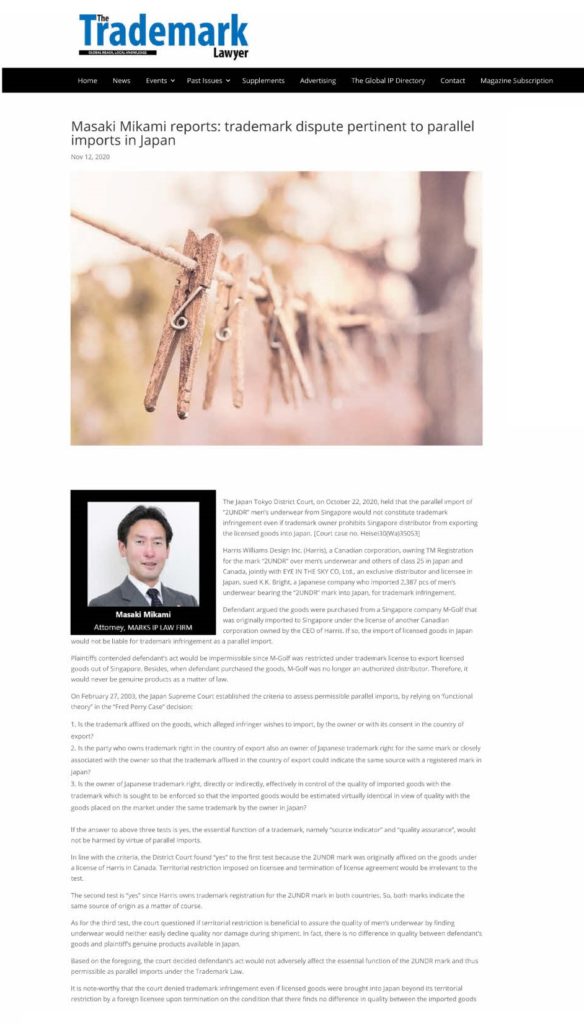知財に関する世界三大メディアの一つ「The Trademark Lawyer」からの取材依頼に応じ、東京地裁が2020年10月22日に下した、並行輸入に関する商標権侵害訴訟事件判決(平成30(ワ)35053)について、マークスの三上代表弁理士が事件の概要及び判決のポイントを英語で解説した記事が、Trademark Lawyer Magazine.comサイトに掲載されました。
[メディア掲載日:2020.11.12]
The Japan Tokyo District Court, on October 22, 2020, held that the parallel import of “2UNDR” men’s underwear from Singapore would not constitute trademark infringement even if the trademark owner prohibits the Singapore distributor from exporting the licensed goods into Japan. [Court case no. Heisei30(Wa)35053]
On February 27, 2003, the Japan Supreme Court established the criteria to assess permissible parallel imports, by relying on ‘functional theory” in the “Fred Perry Case” decision:
- Is the trademark affixed on the goods, which the alleged infringer wishes to import, by the owner or with its consent in the country of export?
- Is the party who owns trademark right in the country of export also an owner of Japanese trademark right for the same mark or closely associated with the owner so that the trademark affixed in the country of export could indicate the same source with a registered mark in Japan?
- Is the owner of Japanese trademark right, directly or indirectly, effectively in control of the quality of imported goods with the trademark which is sought to be enforced so that the imported goods would be estimated virtually identical in view of quality with the goods placed on the market under the same trademark by the owner in Japan?
If the answer to the above three tests is yes, the essential function of a trademark, namely “source indicator” and “quality assurance”, would not be harmed by virtue of parallel imports.
In line with the criteria, the District Court found “yes” to the first test because the 2UNDR mark was originally affixed on the goods under a license of Harris in Canada. A territorial restriction imposed on licensee and termination of license agreement would be irrelevant to the test.
The second test is “yes” since Harris owns a trademark registration for the 2UNDR mark in both countries. So, both marks indicate the same source of origin as a matter of course.
As for the third test, the court questioned if a territorial restriction is beneficial to assure the quality of men’s underwear by finding underwear would neither easily decline quality nor damage during shipment. In fact, there is no difference in quality between the defendant’s goods and the plaintiff’s genuine products available in Japan.
Based on the foregoing, the court decided the defendant’s act would not adversely affect the essential function of the 2UNDR mark and thus permissible as parallel imports under the Trademark Law.

